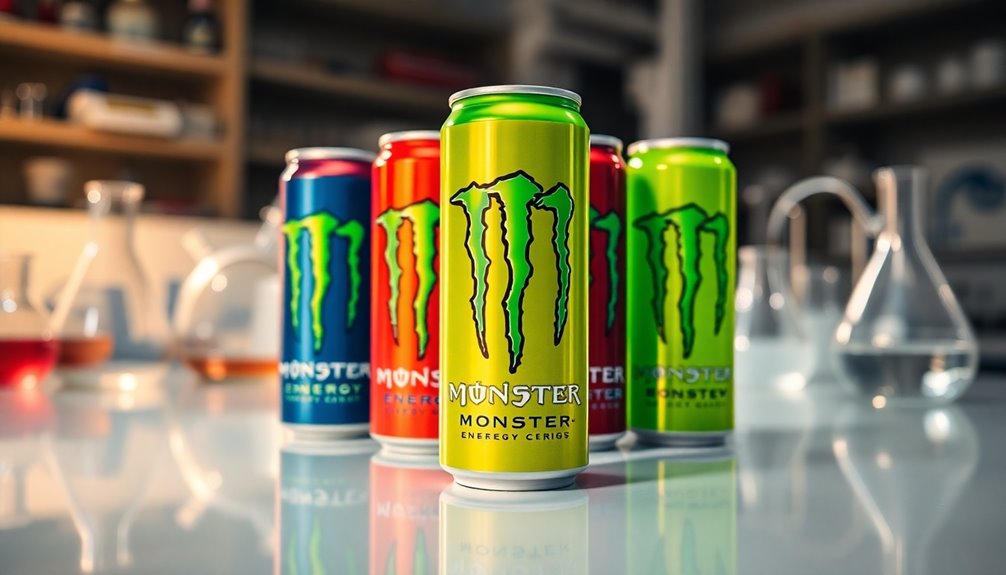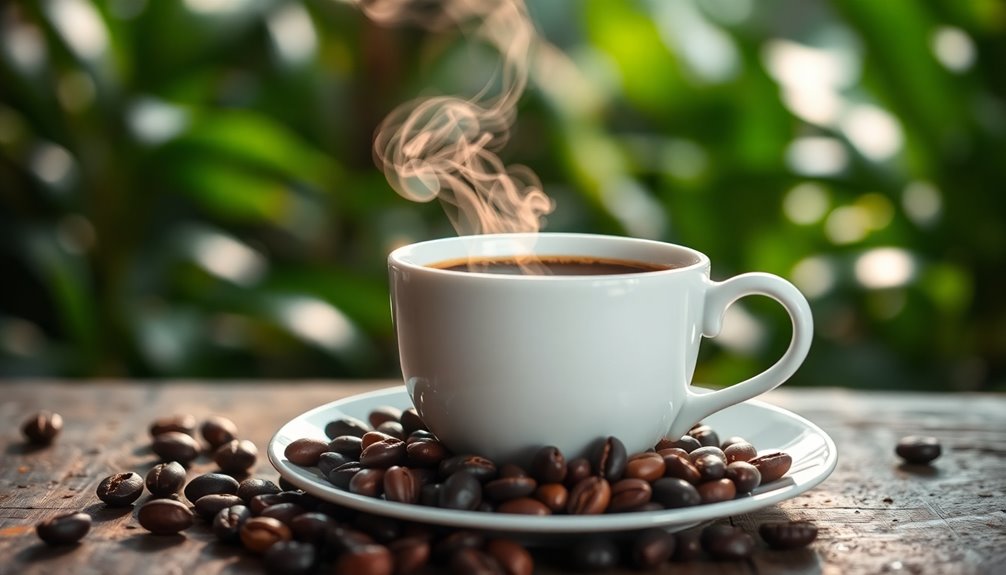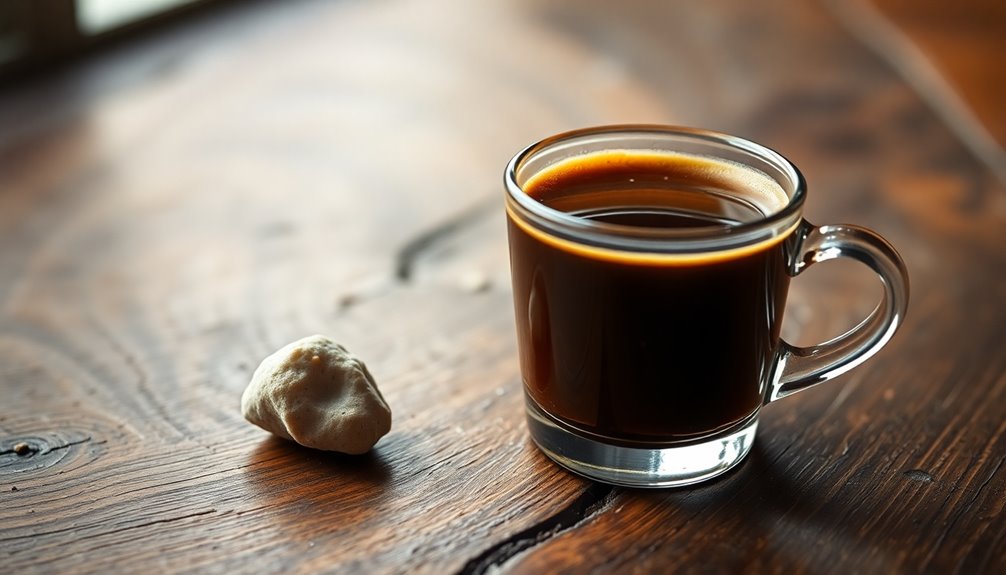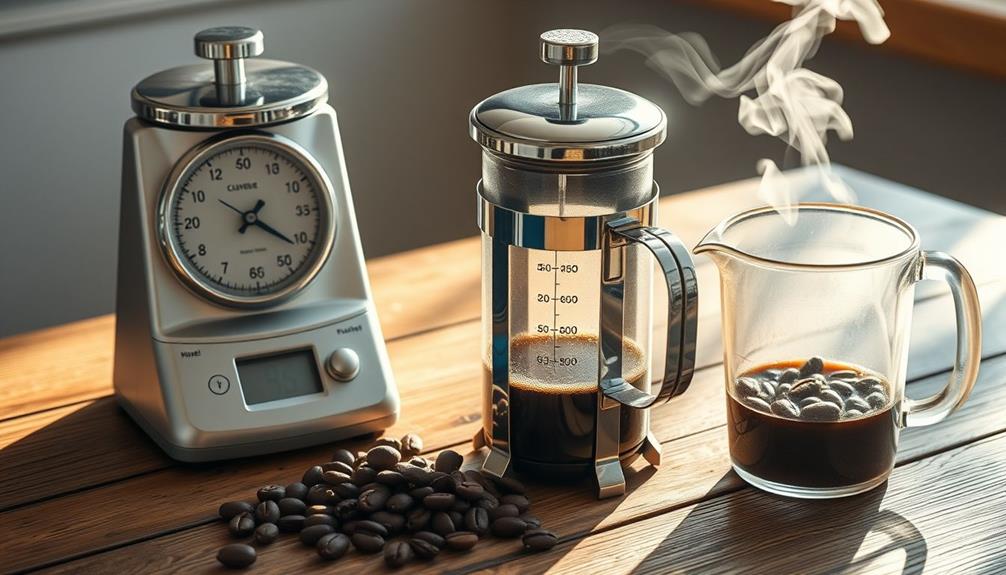Monster Energy drinks have a significant caffeine content, with each 16 oz can containing between 150 and 170 mg. That's particularly higher than an average 8 oz cup of coffee, which has about 100 mg. If you choose Monster Zero Sugar or the traditional flavor, you'll get around 160 mg per can. This amount can lead to potential health risks, especially with excessive consumption, as it easily adds up. Make sure to monitor your intake to stay within the recommended daily limit of 400 mg. There's more to uncover about the effects and alternatives available, so stay tuned!
Key Takeaways
- A 16 oz can of Monster Energy drinks typically contains between 150-170 mg of caffeine, with the original flavor having 166 mg.
- Monster Zero Sugar and Traditional Monster both have approximately 160 mg of caffeine per 16 oz can.
- Some energy drinks may exceed labeled caffeine levels by over 20%, leading to potential health risks.
- The FDA does not require disclosure of actual caffeine content, causing confusion for consumers.
- It's recommended to limit caffeine intake to a maximum of 400 mg per day, roughly equivalent to two cans.
Caffeine Levels in Monster Energy
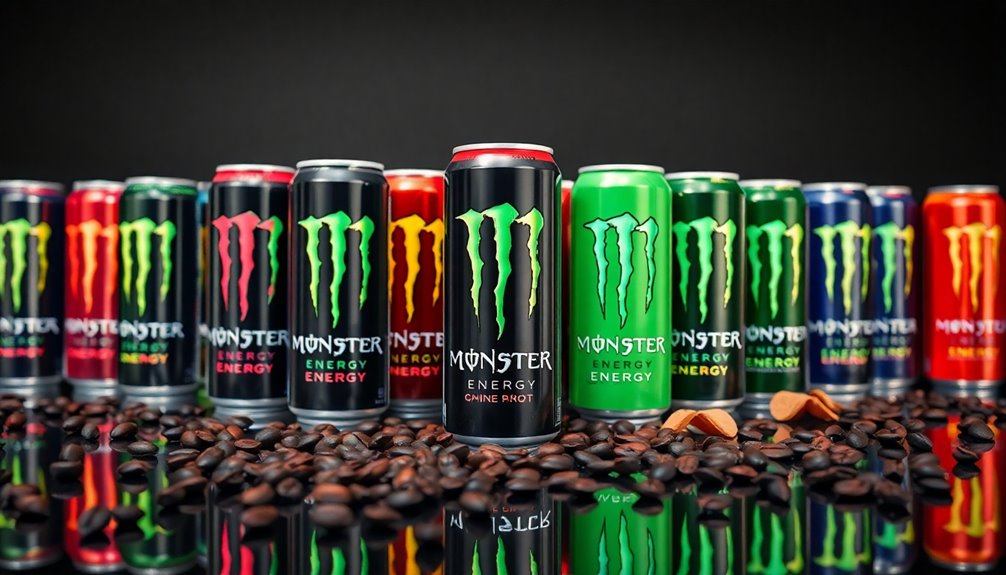
When you crack open a can of Monster Energy, you're likely getting a hefty dose of caffeine. With 150-170 mg of caffeine per 16 oz can, the original flavor contains 166 mg, making it considerably stronger than an average 8 oz cup of coffee, which has about 100 mg.
You mightn't realize that some energy drinks, including Monster, can have caffeine levels exceeding what's stated on their labels—sometimes by more than 20%. The FDA doesn't require energy drink companies to disclose this caffeine content, which can lead to confusion and safety concerns.
Keep in mind that the recommended maximum daily intake for healthy adults is 400 mg, so drinking multiple cans could push you into the territory of excessive caffeine consumption.
Health Risks of Excessive Caffeine
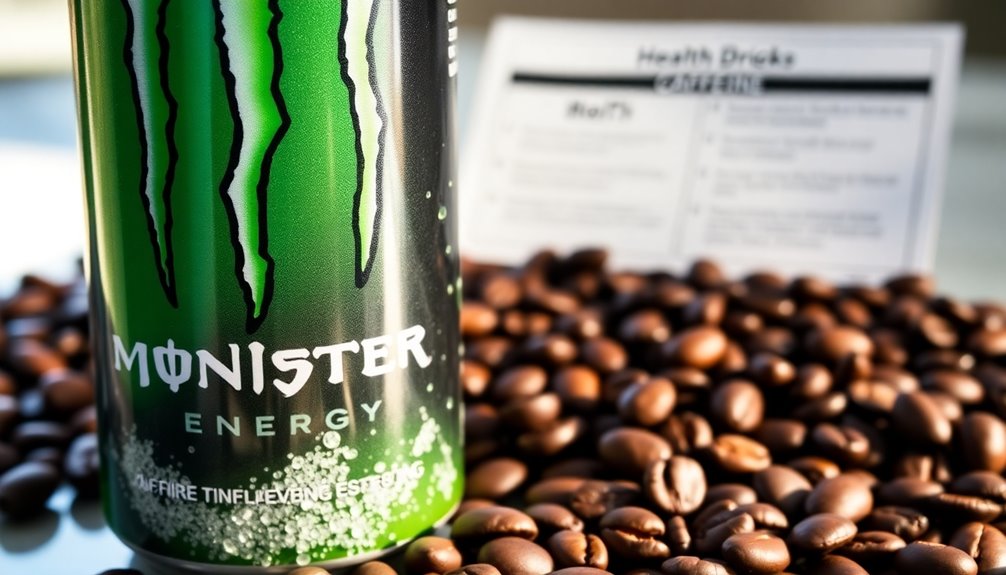
Excessive caffeine consumption can pose serious health risks, especially when it comes from high-caffeine products like Monster Energy drinks.
Here are three major concerns you should be aware of:
- Heart Issues: High caffeine intake can lead to increased blood pressure and heart palpitations, raising your risk of cardiovascular problems.
- Mental Health Side Effects: You might experience anxiety, mood swings, and irritability due to the rapid absorption of caffeine.
- Withdrawal Symptoms: If you suddenly cut down on caffeine, expect headaches and irritability as your body adjusts.
Sugar Content and Its Effects

Although many people enjoy the boost from Monster Energy drinks, the high sugar content is a significant concern that can lead to various health issues.
With approximately 54 grams of sugar per 16 oz can, you're consuming about 13 teaspoons in one sitting. This sugar overload can cause dramatic spikes in blood sugar, resulting in rapid crashes that leave you feeling irritable and fatigued.
If you have preexisting heart conditions, the health effects of this sugar can worsen your situation. Regularly consuming these drinks can increase your risk of Type 2 diabetes and weight gain, and the sugary residue can lead to dental problems.
Ultimately, this cycle of dependence on sugar for an energy boost isn't worth the long-term consequences.
Comparing Monster to Other Drinks
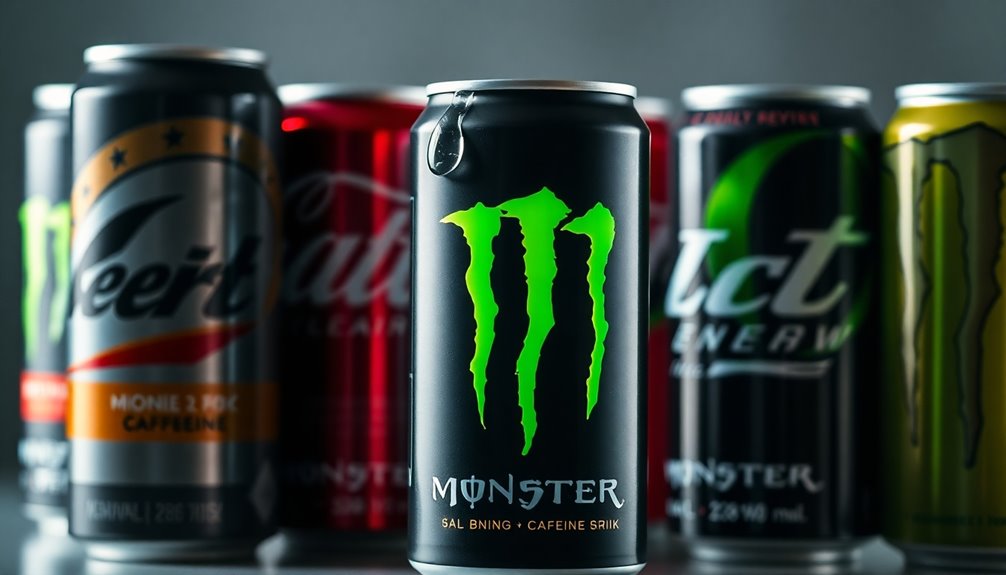
While the high sugar content in Monster Energy drinks raises health concerns, it's also important to look at how their caffeine levels stack up against other beverages.
Here's a quick comparison:
- Monster Energy: A 16 oz can contains about 160 mg of caffeine.
- Coffee: An 8 oz cup typically has around 100 mg, meaning you'd need to drink two cups to match Monster's caffeine.
- Espresso: A standard shot delivers about 75 mg, while strong Vietnamese coffee can hit 130 mg.
When you compare these caffeine levels, Monster Energy stands out, providing a more immediate energy boost and being comparable to other brands, which usually range from 150-170 mg per can.
Ingredients That Raise Concerns
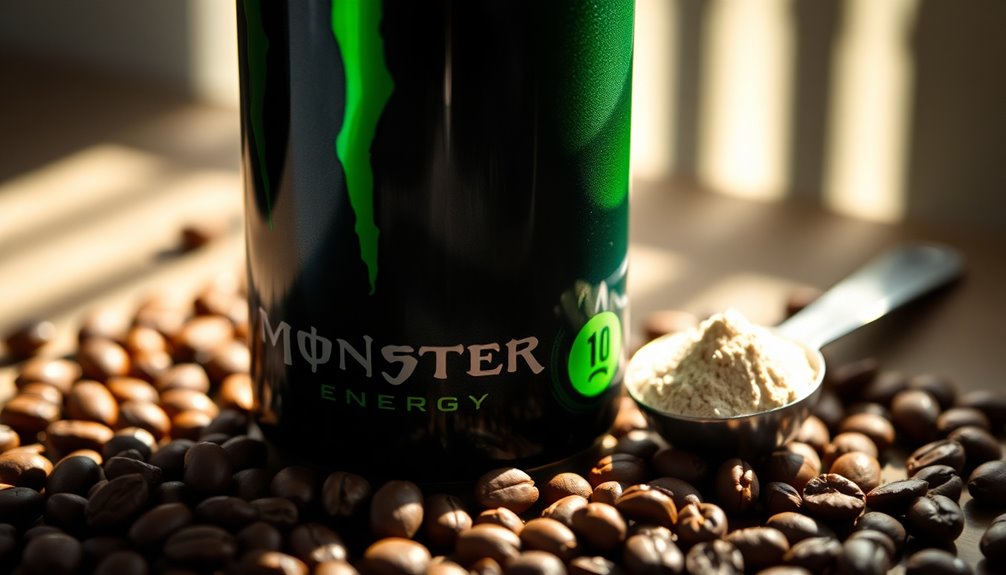
When you crack open a can of Monster Energy, you might be drawn in by the promise of a quick energy boost, but it's essential to reflect on the ingredients that raise health concerns.
The 160 mg of caffeine anhydrous per can can lead to caffeine toxicity, causing jitters and heart palpitations. Coupled with 54 grams of sugar, you face dramatic blood sugar spikes that can result in irritability and fatigue.
Additionally, artificial ingredients like synthetic taurine may stress your heart and affect liver health over time. These factors create serious health consequences, especially for those with preexisting heart conditions.
The addictive nature of this combination can also lead to dependency, making it harder to break the cycle of consumption.
Safe Consumption Guidelines

When it comes to enjoying Monster Energy drinks, knowing your limits is essential.
You should aim to stay within the recommended maximum of 400 mg of caffeine per day, which means no more than two cans.
Additionally, keep in mind the guidelines about spacing out your consumption to minimize health risks.
Daily Caffeine Limits
Most healthy adults can safely consume up to 400 mg of caffeine daily, roughly equivalent to four 8 oz cups of brewed coffee.
When considering your caffeine intake, keep these daily caffeine limits in mind:
- Regular Adults: Up to 400 mg is generally safe.
- Energy Drinks: Monster Energy drinks contain around 160 mg per 16 oz can, so moderation is key.
- Pregnant Women: It's recommended to keep caffeine below 200 mg per day and consult with healthcare providers.
Exceeding these limits can lead to negative health effects like jitters, insomnia, and anxiety.
Always listen to your body and adjust your consumption accordingly to guarantee you stay within safe boundaries.
Consumption Recommendations
Although energy drinks can offer a quick boost, it's vital to follow safe consumption guidelines to minimize health risks. Here are some essential consumption recommendations:
| Guideline | Details |
|---|---|
| Maximum Daily Intake | 400 mg of caffeine (about 2 cans of Monster) |
| Time Between Cans | At least 4 hours between cans |
| Daily Can Limit | No more than 3 cans per day |
| Special Populations | Avoid for children, pregnant women, and caffeine-sensitive individuals |
Be aware of your personal tolerance and health conditions. Overconsumption can lead to jitters, insomnia, and increased heart rate. Always prioritize your well-being when enjoying energy drinks.
Healthier Alternatives Available
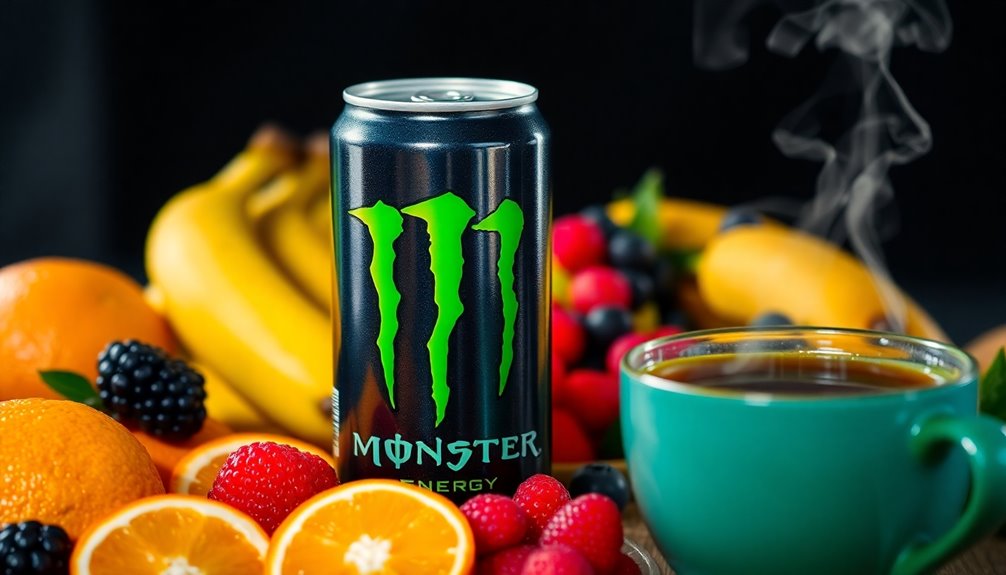
If you're looking for healthier alternatives to Monster Energy drinks, consider natural energy sources like Wholesome Organics Clean Energy Shots.
These sugar-free options not only provide a steady boost from ingredients like yerba mate but also include adaptogens like ashwagandha for added mental clarity. Additionally, incorporating anti-inflammatory herbs into your diet can further enhance your overall health and well-being.
Natural Energy Sources
Finding healthier alternatives to high-caffeine energy drinks can greatly enhance your well-being.
By choosing natural energy sources, you can enjoy steady energy without the jitters. Here are three options to evaluate:
- Wholesome Organics Clean Energy Shots: These contain yerba mate and guarana, offering lower caffeine levels and zero added sugars.
- Green Tea: Packed with antioxidants, it provides a gentler energy boost and supports overall wellness.
- Matcha: This finely ground green tea delivers a sustained energy release while promoting mental clarity.
Opting for these healthier alternatives not only helps you avoid the negative effects of high caffeine and sugar consumption but also fosters better overall wellness. Additionally, incorporating healthy fats, such as those found in the keto diet, can further support sustained energy levels throughout the day.
Make the switch for a more balanced approach to energy!
Sugar-Free Options
Many people are turning to sugar-free options as a healthier way to get their energy fix. Monster Energy's Zero Sugar line is a popular choice, providing the energy boost without the high sugar content. These drinks use artificial flavors and sweeteners like sucralose and acesulfame potassium to maintain their taste while keeping calories low. They prevent blood sugar spikes, promoting more stable energy levels. However, it's important to monitor your intake since they still contain 150 to 170 mg of caffeine per 16 oz can. Here's a quick comparison:
| Drink Type | Caffeine Content (mg per 16 oz) |
|---|---|
| Monster Zero Sugar | 160 |
| Traditional Monster | 160 |
| Wholesome Organics | 100 |
Adaptogenic Ingredients Benefits
While traditional energy drinks often rely on high caffeine and sugar to deliver a quick boost, healthier alternatives infused with adaptogenic ingredients are gaining popularity for their holistic benefits.
These natural components can help you manage stress and enhance mental clarity. Here are three key benefits of adaptogenic ingredients:
- Stress Reduction: They support a balanced response to stressors, potentially lowering anxiety levels.
- Improved Cognitive Function: Adaptogens can enhance focus and mental performance without the jitters associated with high caffeine consumption.
- Sustainable Energy: By utilizing natural sources of caffeine, like yerba mate, these alternatives provide a gradual energy release, reducing sugar crashes typically seen in energy drinks.
Incorporating adaptogens into your diet can lead to significant health benefits over time. Additionally, research shows that adaptogenic ingredients can improve overall wellness by promoting resilience against physical and emotional stressors.
Consumer Awareness and Safety
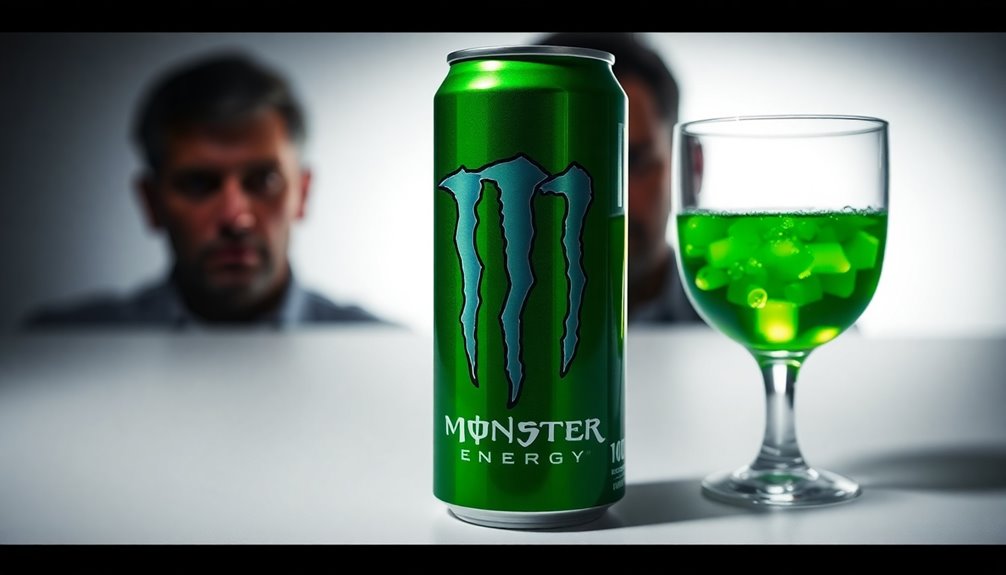
How can you guarantee your safety when consuming energy drinks like Monster Energy? First, stay informed about the caffeine content. Many brands don't accurately disclose their levels, raising concerns about consumer safety. Reports reveal that some drinks exceed stated caffeine levels, making accountability essential.
| Risk Factors | Actions to Take |
|---|---|
| High caffeine content | Check labels carefully |
| Misleading marketing | Research brands thoroughly |
| Lack of regulation | Advocate for stricter laws |
| Reports of adverse effects | Share experiences with others |
| Legal actions against manufacturers | Support accountability initiatives |
Frequently Asked Questions
Is Monster Safer Than Red Bull?
When considering whether Monster's safer than Red Bull, it's essential to weigh caffeine and sugar levels.
Monster packs nearly double the caffeine per serving, which can lead to more significant health risks like increased heart rate and anxiety.
While both drinks have potential side effects, the higher caffeine and sugar content in Monster may elevate those risks.
Ultimately, moderation is key, and you should be cautious with either choice to prioritize your health.
Is 2 Monsters a Day Bad?
If you're guzzling two Monster drinks a day, you might wanna hit the brakes.
You're looking at around 320-332 mg of caffeine, which is pretty close to the daily limit. This can lead to jitters, anxiety, and even insomnia.
Plus, the high sugar content can mess with your blood sugar levels, leaving you feeling drained.
Regularly exceeding these limits might also increase health risks.
How Many Monsters Equal a Cup of Coffee?
If you're trying to compare Monster Energy drinks to coffee, one can of Monster (16 oz) contains about 160 mg of caffeine, while a regular cup of coffee (8 oz) has around 100 mg.
So, if you drink one can of Monster, it's roughly equivalent to 1.6 cups of coffee with regard to caffeine.
Fundamentally, just a little more than one can gives you a solid caffeine boost compared to your usual coffee.
What Wakes You up More, Coffee or Monster?
When you're seeking stimulation, consider coffee's comforting calm versus Monster's mighty mayhem.
Coffee offers a consistent caffeine kick, perfect for a gradual rise, while Monster's powerful punch delivers a quick jolt.
You'll likely feel an immediate surge from Monster, but don't forget about potential jitters.
If you're after sustained energy without the crash, coffee might be your best bet.
It all boils down to your body's unique reaction to each beverage.
Conclusion
In summary, knowing the caffeine content in Monster Energy drinks is essential for your health. Did you know that a 16-ounce can packs about 160 milligrams of caffeine, which is roughly the same as four cups of coffee? This amount can lead to health risks, especially when consumed in excess. By staying informed and following safe consumption guidelines, you can enjoy energy drinks responsibly. Remember, there are healthier alternatives out there that can give you a boost without the risks! It’s important to be aware of the caffeine content in energy drinks, as it can vary widely between brands and products. Some energy drinks may contain even higher levels of caffeine than Monster Energy, so it’s crucial to always check the label before consuming. Understanding the potential health effects of high levels of caffeine consumption can help you make informed decisions about your energy drink intake.
